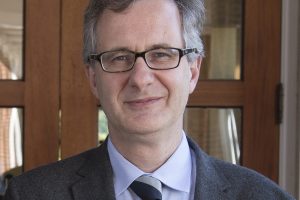
Denis Wirtz, vice provost for research and Theophilus Halley Smoot Professor in the Department of Chemical and Biomolecular Engineering, has been elected a foreign member of the Royal Academy of Medicine of Belgium for his body of scientific work. He is the first engineer and non-MD to be elected.
A member of the 2019 class of inductees, Wirtz will be formally introduced in a ceremony scheduled for January 25, 2020 in Brussels. He also has been invited by the King and Queen of the Belgians to present a public lecture there next year.
An organization comprising 70 members, the Royal Academy of Medicine of Belgium was founded in 1841 and advises the Belgian government on matters pertaining to public health.
Wirtz studies the molecular and biophysical mechanisms of cell motility and adhesion and nuclear dynamics in health and disease, with a special focus on aging, cancer, and progeria. He directs the Johns Hopkins Physical Sciences-Oncology Center and co-directs the Cancer Nanotechnology Training Center, both National Cancer Institute-funded entities. He is a co-founder and former associate director of the Johns Hopkins Institute for NanoBioTechnology.
Letter from the Dean: Dear WSE faculty and staff,
It is with pride and pleasure that I share the news that Denis Wirtz, vice provost for research and Theophilus Halley Smoot Professor in the Department of Chemical and Biomolecular Engineering, has been elected a foreign member of the Royal Academy of Medicine of Belgium for his body of scientific work. He is the first engineer and non-MD to be elected.
A member of the 2019 class of inductees, Denis will be formally introduced in a ceremony scheduled for January 25, 2020 in Brussels. He also has been invited by the King and Queen of Belgium to present a public lecture there next year.
An organization comprising 70 members, the Royal Academy of Medicine of Belgium was founded in 1841 and advises the Belgian government on matters pertaining to public health.
Denis studies the molecular and biophysical mechanisms of cell motility and adhesion and nuclear dynamics in health and disease, with a special focus on aging, cancer, and progeria. He directs the Johns Hopkins Physical Sciences-Oncology Center and co-directs the Cancer Nanotechnology Training Center, both National Cancer Institute-funded entities. He is a co-founder and former associate director of the Johns Hopkins Institute for NanoBioTechnology.
Please join me in congratulating Denis on this impressive recognition.
Sincerely,
Ed Schlesinger
Benjamin T. Rome Dean